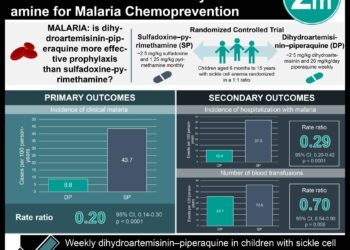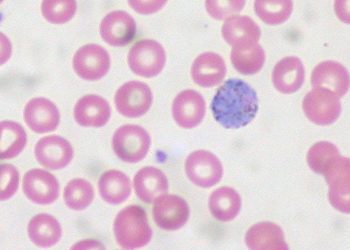Iron use does not increase incidence of malaria in young children
Image: PD
1. After adjustments, the overall incidence of malaria was not statistically different between a group of children receiving iron-fortified micronutrients in comparison to a group of children receiving micronutrients without iron.
2. There was no increased risk of malaria noted amongst children who were iron replete and had anemia at baseline.
Evidence Rating Level: 1 (Excellent)
Study Rundown: Malaria is a leading cause of childhood morbidity and mortality in sub-Saharan Africa. Prior studies had suggested that iron deficiency, another common problem in the region, not only offered protection against malaria infection, but that iron supplementation may actually increase malaria morbidity and mortality. Based on these studies, the World Health Organization and the United Nations Children’s Fund released a joint statement in 2006 recommending limited use of iron supplements in children due to concerns of increased malaria risk. Assessing the impact of daily fortification with powdered micronutrients including iron on malaria incidence in the malaria-endemic setting of central Ghana, this study found that the overall incidence of malaria was lower in the group receiving iron fortified powdered micronutrients compared to the no iron group prior to adjustments. However, after adjusting for baseline values of iron deficiency and moderate anemia, these differences were no longer found to be statistically significant. Regardless, based upon this study, iron supplementation did not increase one’s risk of malaria.
Consequently, the results of this study provide further supportive evidence for iron supplementation in malaria-endemic regions.
Click to read the study, published today in JAMA
In-Depth [community-based, cluster randomized trial]: This study utilized a community-based, cluster randomized trial in the Wenchi and Tain districts of central Ghana to enroll children aged 6 to 35 months eating solid foods and living in the study area for at least the following 6 months. Participants were randomized by cluster to an iron group or no iron group, with those in the iron group receiving a micronutrient product fortified with iron. The no iron group received a similar fortification that did not contain iron. At enrollment, each child received a 1 week supply of micronutrient packages and an insecticide-treated bed net. Households were visited weekly by a field researcher who collected information on adherence, conducted a health assessment, assessed for morbidity, and replenished the supply of micronutrient products. Malaria episodes were measured in the iron group compared to the no iron group during the 5-month intervention period. The overall incidence of malaria was lower in the group receiving iron fortified powdered micronutrients than in the no iron group (RR, 0.87; 95% CI, 0.78-0.96), but after adjustments for baseline values of iron deficiency and moderate anemia, these differences were no longer found to be statistically significant (RR, 0.87 [95% CI, 0.75-1.01]. No increased risk of malaria was noted amongst those children who were iron replete and had anemia at baseline.
By Priyanka Vedak and Rif Rahman
© 2013 2minutemedicine.com. All rights reserved. No works may be reproduced without expressed written consent from 2minutemedicine.com. Disclaimer: We present factual information directly from peer reviewed medical journals. No post should be construed as medical advice and is not intended as such by the authors, editors, staff or by 2minutemedicine.com. PLEASE SEE A HEALTHCARE PROVIDER IN YOUR AREA IF YOU SEEK MEDICAL ADVICE OF ANY SORT.




